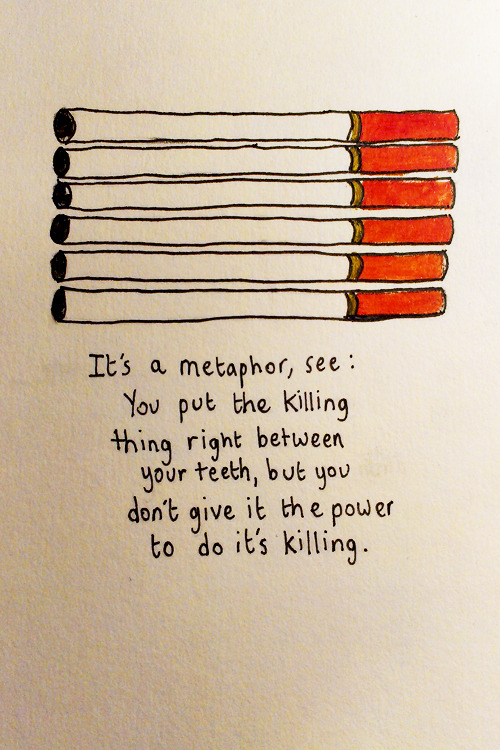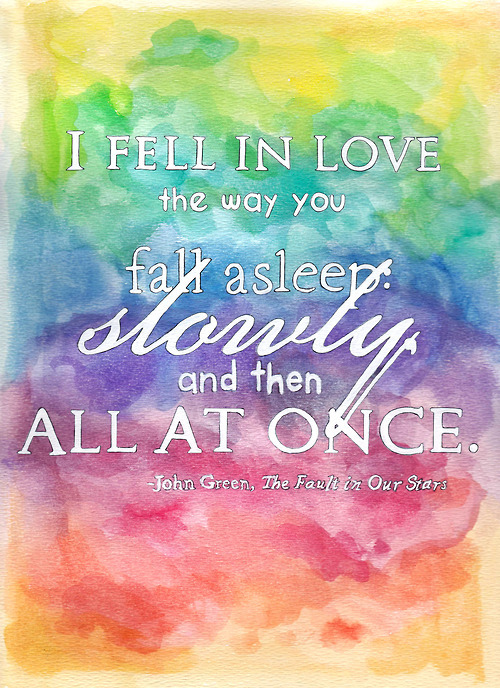 “Cancer stories suck,” declares Hazel, the protagonist of John Green’s The Fault in Our Stars. One-fifth of the way into the book, no less. This is an odd introduction to a book that details the life and times of a girl living with (and dying of) thyroid cancer. Yet, it also provides a fair outline of Green’s vision for this novel. The message is clear: Green doesn’t want to write a story about The Cancer Patient (usually manifest as a precocious child who through extensive suffering develops a complete understanding of the Meaning of Life. Unfortunately, as Hazel astutely points out, “the existence of broccoli does not affect the taste of chocolate”). Instead, he wants to write a story about people who happen to have cancer. Does Green succeed? Kind of.
“Cancer stories suck,” declares Hazel, the protagonist of John Green’s The Fault in Our Stars. One-fifth of the way into the book, no less. This is an odd introduction to a book that details the life and times of a girl living with (and dying of) thyroid cancer. Yet, it also provides a fair outline of Green’s vision for this novel. The message is clear: Green doesn’t want to write a story about The Cancer Patient (usually manifest as a precocious child who through extensive suffering develops a complete understanding of the Meaning of Life. Unfortunately, as Hazel astutely points out, “the existence of broccoli does not affect the taste of chocolate”). Instead, he wants to write a story about people who happen to have cancer. Does Green succeed? Kind of.
The book’s plot is simple enough. Girl with cancer (in this case, Hazel) meets boy with cancer (in this case, the dreamy and dramatic Augustus Waters). Girl falls in love with boy. Girl also happens to be in love with “An Imperial Affliction”, a book by the mysterious Peter Van Houten about another girl with cancer. Unfortunately, this book also happens to end mid-sentence. Thus, Hazel and Augustus decide to travel to Amsterdam to meet Van Houten to find out the fates of the book’s characters. (Random fact: have you noticed that all of John Green’s solo books to date are heavy on the road trips?)
This plot-line isn’t exactly original. However, Green does differentiate himself from the vast majority of YA writers by succeeding at being absolutely hilarious. The characters have distinct voices too: Hazel is sarcastic and wittily observant; Augustus is grandiose and theatrical. Indeed, the dialogue almost too entertaining. Neither character accurately passes for anything remotely resembling a modern day teenager. Perhaps this fault is forgivable: to remove the humor would also be to remove much of the book’s emotional impact. By the book’s end, it becomes apparent that humor is, for the characters, another method of coping. Thus, Green’s humor is not only inherently enjoyable but also serves to underline the tragedy of his book.
Green doesn’t just succeed at being funny, his writing is also remarkably profound. The prose in the book (when not being hilarious) is absolutely beautiful. In fact, Green’s stream of insight begins right in the book’s second paragraph (“In fact, depression is not a side effect of cancer. Depression is a side effect of dying.” And things only escalate from here).
So, is this book successfully divorced from the cancer book tropes that Hazel so despises? Thematically, yes. Ultimately, Green’s overlying message refutes the assertion that death has to be meaningful. When people die, there is not always a metaphor to be decrypted or a lesson to be learned. Death is only a product of chance (thus the fault is not in Augustus or Hazel themselves but rather in their stars). In this way, the book not only rings fairly true to reality, but also rises above the story of the Cancer Patient and the Meaning of Life. Yet, Green’s message is also surprisingly uplifting: because death is meaningless, we should pursue meaning in life.
But this book’s purpose isn’t solely to deliver profound messages; it’s also to provoke an emotional response. Here, Green passes with flying colors. The problem is that he also cheats. This book is sad, yes, but it is sad largely because Green draws on familiar (and manipulative!) tropes and plot devices, many of which he himself derides. Hazel continually shows disgust at the archetype of the precocious cancer patient. However, much of the book’s emotional resonance exist only because Hazel and Augustus are wiser than any teenager (and most adults for that matter. For the perfect example, see the very end of the book).
Even Augustus himself is really not a complex character but rather a vehicle for emotional manipulation. Never is Augustus painted as a genuine human being with real flaws and imperfections of his own (no, having cancer doesn’t count. Having borderline delusion heroic fantasies might, except this flaw never actually affects the plot). His character only seems to exist to compliment Hazel. For the first half of the book, he is constructed as a perfect dreamboat (think Zooey Deschanel but male). During the second half, his character’s role is even more forced. Yes, Augustus does fulfill his function perfectly, but his lack of substance ultimately breaks the book’s central romance.
Fundamentally, The Fault in Our Stars is a good novel. Green himself proves a talented writer with an excellent grasp on both prose and thematic composition. I do believe that this man is capable of eventually writing a literary masterpiece. This book, however, is not there yet.
Final rating: 8/10



